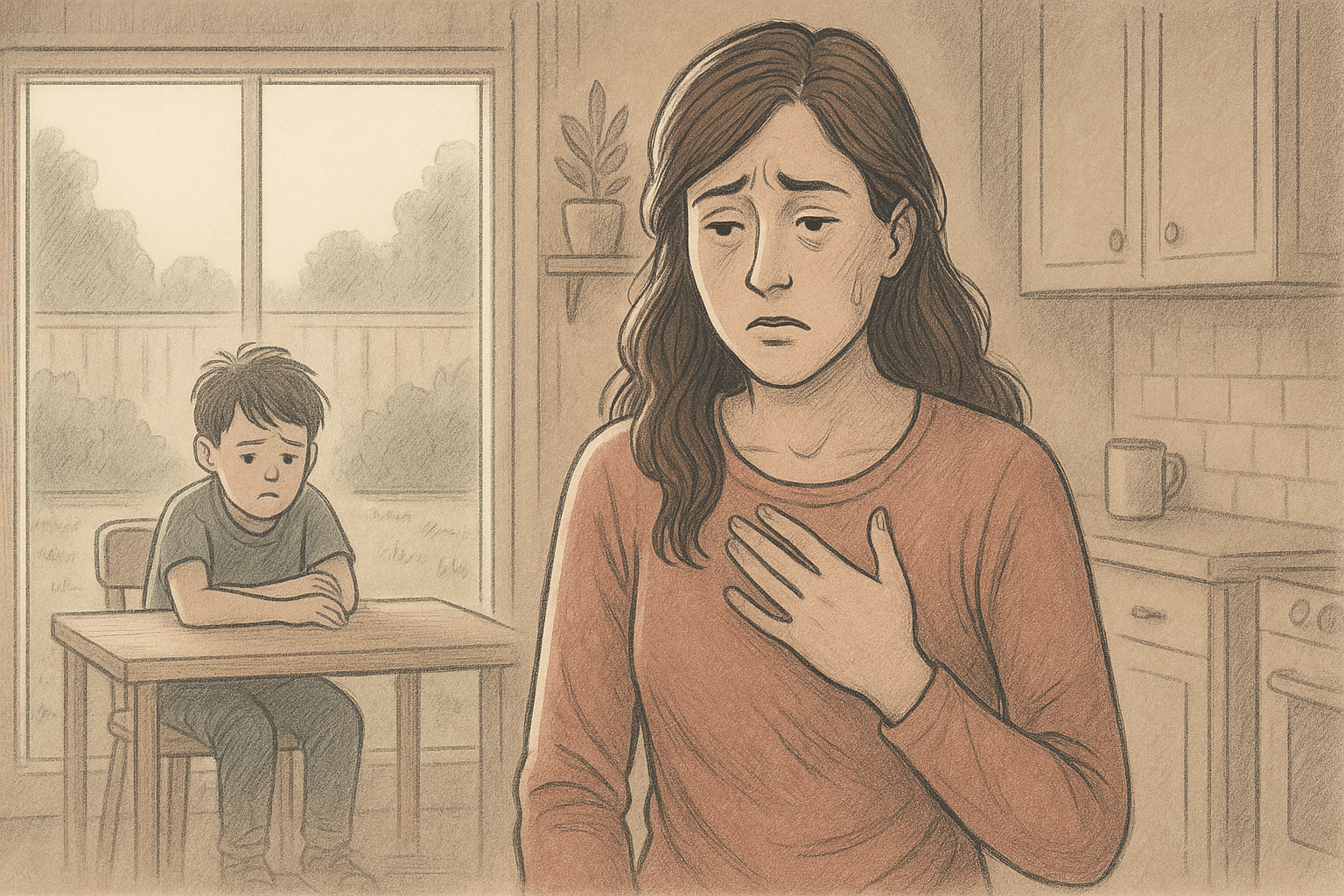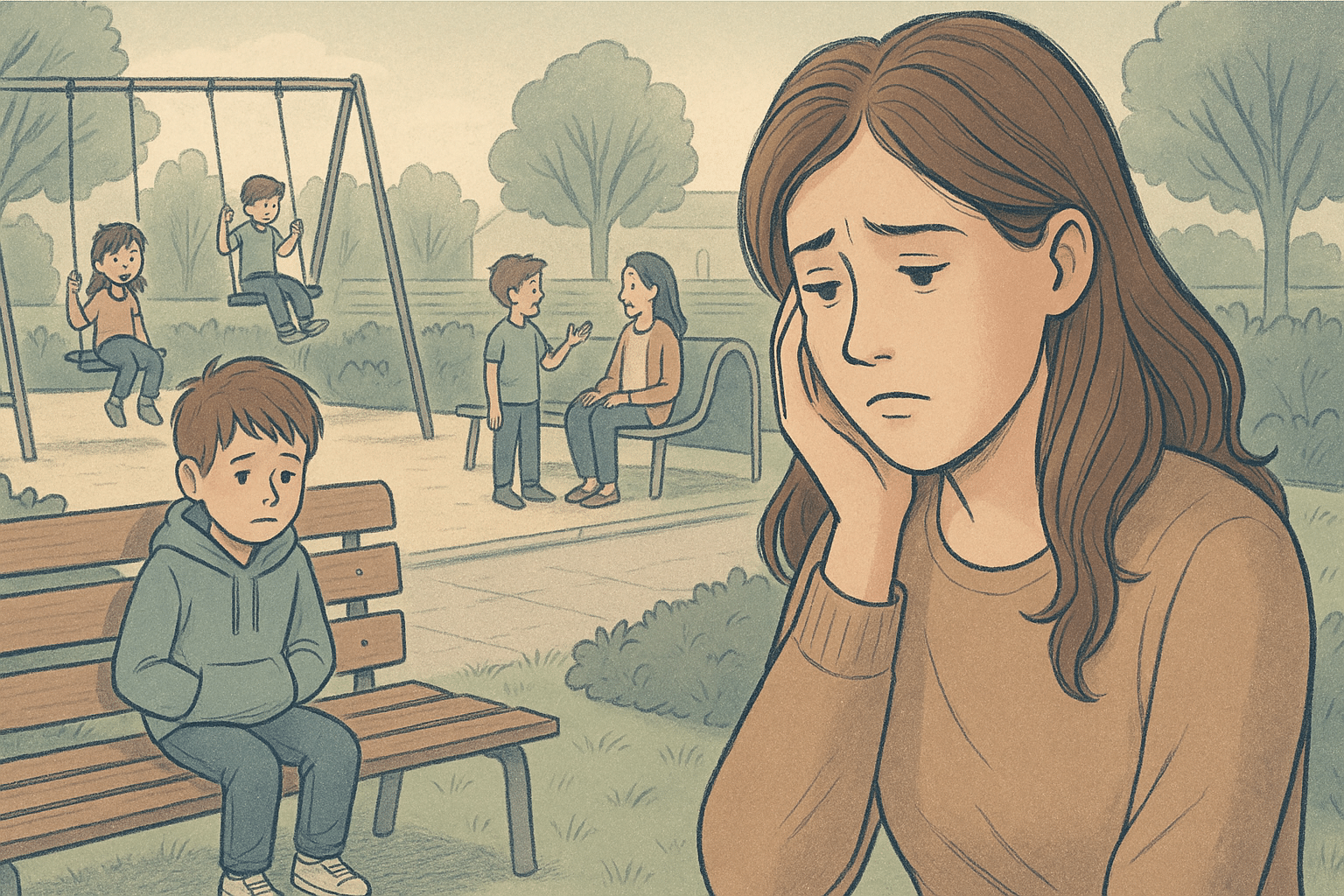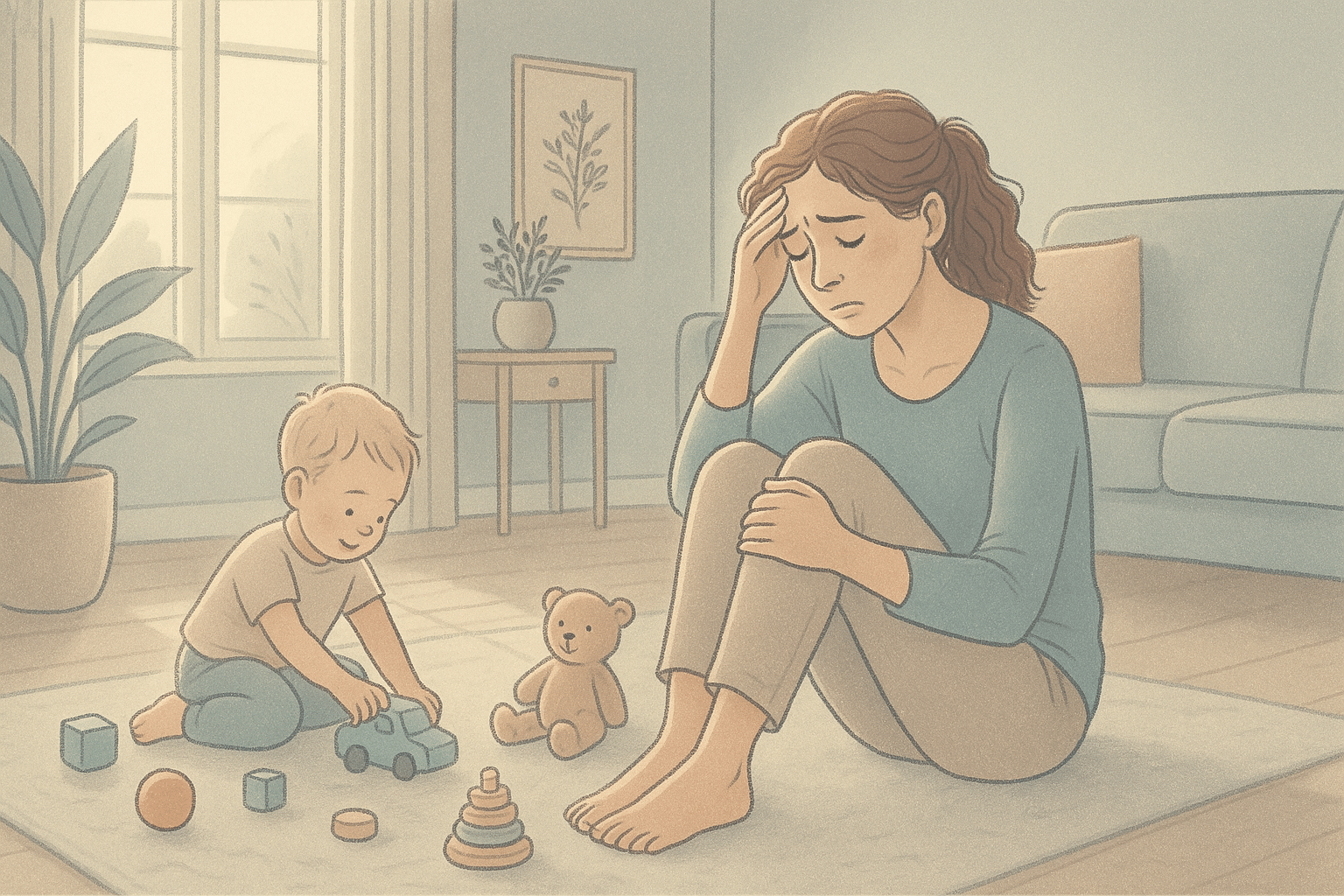Key Takeaways
- Parental anxiety is a common experience where children can unintentionally trigger anxiety attacks in their caregivers, affecting up to 1 in 5 parents.
- Physical symptoms of parental anxiety include racing heart, shortness of breath, chest tightness, and can escalate to full panic attacks when triggered by child-related situations.
- Recognizing your specific triggers, whether developmental concerns, health worries, or social situations, is the first step toward managing parental anxiety.
- Children can absorb anxiety from their parents, potentially developing similar anxiety patterns through observation and emotional contagion.
- A Mission For Michael provides comprehensive parental anxiety treatment using evidence-based approaches including Cognitive-Behavioral Therapy, family therapy, and mindfulness techniques. Our specialized programs help parents develop healthy coping strategies while strengthening the parent-child relationship.
When Kids Trigger Anxiety
Children don’t intentionally cause anxiety in their parents, but certain situations involving them can activate your body’s stress response system. This doesn’t mean you love your child any less or that you’re failing as a parent. In fact, anxiety often stems from how deeply you care. When your child is having a tantrum, struggling socially, or facing health issues, your protective instincts can sometimes spiral into parental anxiety or panic.
Parental anxiety differs from ordinary parenting stress. While stress is a normal response to challenging situations, anxiety persists even when immediate stressors are absent. You might find yourself catastrophizing about your child’s future, obsessively checking on them while they sleep, or experiencing physical symptoms when confronted with certain parenting scenarios. These responses signal that your nervous system is stuck in a heightened state of alert.
This heightened state can be triggered by various child-related situations: a toddler’s defiance, a teen’s risky behavior, or even ordinary developmental milestones that remind you of how quickly time passes. The brain doesn’t always distinguish between actual threats and perceived ones, which explains why seemingly mundane parenting moments can trigger a full anxiety response.
Founded in 2010, A Mission For Michael (AMFM) offers specialized mental health care across California, Minnesota, and Virginia. Our accredited facilities provide residential and outpatient programs, utilizing evidence-based therapies such as CBT, DBT, and EMDR.
Our dedicated team of licensed professionals ensures every client receives the best care possible, supported by accreditation from The Joint Commission. We are committed to safety and personalized treatment plans.
Signs You’re Experiencing Parental Anxiety
Physical Symptoms

The body’s physical response to anxiety often presents as a tight feeling in your chest and can be particularly intense when triggered by situations involving your child.
You might experience a racing heart, shortness of breath, or chest tightness when your child is having a tantrum. Some parents report feeling lightheaded during school drop-offs or experiencing stomach knots when their child faces a social challenge.
These physical symptoms can escalate to full panic attacks, characterized by overwhelming fear and physical discomfort that peaks within minutes.
Thought Patterns
You might find yourself constantly anticipating the worst possible outcomes: “What if my child never learns to read properly?” or “What if this minor illness is actually something serious?” These catastrophic thoughts create a mental loop that’s difficult to escape.
Another common pattern is black-and-white thinking about parenting choices: “If I don’t handle this perfectly, I’ll damage my child forever.” These rigid thought patterns increase anxiety and undermine your confidence as a parent.
Behavioral Changes
When anxiety takes hold, your parenting behavior often changes in noticeable ways. You might become overly controlling, attempting to micromanage your child’s experiences to prevent possible harm or disappointment.
Alternatively, you might avoid certain situations altogether, skipping birthday parties, refusing to let your child play sports, or hovering excessively during playdates. These avoidance behaviors provide temporary relief but ultimately reinforce your anxiety while potentially limiting your child’s experiences.
Common Triggers of Parental Anxiety
Developmental Concerns
Many parents experience heightened anxiety around their child’s developmental milestones. When your toddler isn’t speaking as early as others or your school-aged child struggles with reading, these situations can trigger intense worry about their future.
The comparison trap is particularly dangerous here, seeing other children progressing faster than yours can activate deep-seated fears about your child’s potential or your parenting abilities.
Health Worries
Child health concerns rank among the most common anxiety triggers for parents. From routine childhood illnesses to more serious medical conditions, the vulnerability you feel when your child is sick can be overwhelming.
Parents who have experienced medical trauma with their children may develop heightened anxiety responses even to minor symptoms, a form of medical PTSD that deserves compassionate attention.
Social Situations

Watching your child manage social interactions can trigger anxiety, especially if you notice them struggling to make friends or experiencing rejection.
Parents often report anxiety spikes during school drop-offs, birthday parties, or when observing playground patterns. This anxiety may be especially pronounced if you experienced social difficulties in your own childhood or if your child has temperamental traits that make social situations challenging.
The fear that your child will be excluded or bullied can be paralyzing, sometimes leading to overprotective behaviors that ironically might limit your child’s opportunity to develop resilience and social skills through natural experiences.
School Performance
Report card day, parent-teacher conferences, or homework struggles often trigger anxiety responses as parents worry about their child’s future prospects. This trigger is frequently intensified by your own school experiences or by cultural and family expectations about achievement.
The pressure to ensure your child excels academically can lead to anxiety-driven behaviors like excessive homework monitoring or placing unrealistic pressure on children, potentially creating a cycle where both parent and child experience performance anxiety.
Impact on Your Family
How Children Absorb Anxiety
Children are remarkably perceptive to their parents’ emotional states, often absorbing anxiety without anyone explicitly discussing it. This emotional contagion happens through both observation and physiological mechanisms, as children’s developing nervous systems attune to their caregivers’ stress responses.
Effects on Parenting Style
Anxiety fundamentally alters how you parent, often pushing you toward extremes of control or avoidance. When you’re in the grip of anxiety, your natural instinct is to either eliminate all potential risks for your child or avoid situations that trigger your own discomfort. These reactions make perfect sense as protective mechanisms but can limit your child’s development of independence and resilience.
Relationship Strain
Parental anxiety places significant pressure on partnerships and co-parenting relationships. Disagreements about risk assessment are common, with the more anxious parent often advocating for greater caution while the less anxious parent may push for more independence. These differences can lead to ongoing conflict, with each parent believing they’re protecting their child’s best interests.
Breaking the Cycle
1. Recognize Your Triggers
The first step in managing anxiety is identifying the specific situations involving your child that trigger your stress response. Look for patterns, perhaps transitions like school drop-offs consistently trigger anxiety, or maybe it’s when your child is having social difficulties. Understanding your personal triggers allows you to prepare for challenging moments and implement coping strategies before anxiety escalates.
2. Practice Grounding Techniques

When anxiety strikes during parenting moments, having immediate grounding techniques at your disposal can prevent escalation to panic.
The 5-4-3-2-1 technique engages all your senses: identify five things you can see, four things you can touch, three things you can hear, two things you can smell, and one thing you can taste. This simple practice interrupts the anxiety cycle by anchoring you in the present moment rather than catastrophic future scenarios.
3. Seek Help
Seeking professional help can provide both practical assistance and emotional validation. Evidence-based approaches include Cognitive Behavioral Therapy to address catastrophic thinking patterns, family therapy to improve communication and strengthen relationships, and mindfulness techniques for in-the-moment anxiety management.
Understanding Parental Anxiety: AMFM’s Comprehensive Support for Parents
At A Mission For Michael, we understand that parental anxiety creates a unique challenge where your greatest joy also becomes a source of overwhelming stress that can affect both your mental health and your entire family dynamic.
Our specialized treatment programs recognize that parental anxiety requires a different approach than general anxiety disorders. We address the specific triggers that activate your stress response during parenting moments, from developmental concerns to social situations, while helping you develop practical coping strategies that work in real-time parenting scenarios.

AMFM’s comprehensive approach goes beyond symptom management to address the root causes of parental anxiety while strengthening your confidence as a parent.
Our experienced clinicians in California, Virginia, and Washington, understand that you don’t need to be a perfect parent, you need to be a present, emotionally regulated one who can model healthy responses to life’s challenges.
Don’t let anxiety control your parenting experience or limit your child’s opportunities for growth. Contact A Mission For Michael today to learn how our specialized anxiety treatment can help you parent from a place of calm confidence rather than overwhelming fear.
Frequently Asked Questions (FAQ)
How do I explain my anxiety to my children?
Age-appropriate honesty is generally the best approach when explaining anxiety to children. For younger children, simple explanations work best: “Sometimes my brain tells me to worry a lot about keeping you safe, even when things are actually okay. When that happens, I need to take some deep breaths to help my body calm down.” Older children can understand more complex explanations that normalize anxiety as a common human experience while emphasizing that you’re working on managing it effectively.
Should I hide my anxiety attacks from my kids?
This question reflects the natural parental instinct to protect children from difficult experiences. While shielding your child from the most intense manifestations of anxiety is appropriate, completely hiding your emotional experiences creates a disconnect between your internal reality and what your child observes. Children are perceptive—they’ll notice something is wrong even if you don’t name it, which can create confusion and may lead them to develop inaccurate explanations for your behavior.
How quickly can I expect improvement with treatment?
Recovery timelines vary significantly based on anxiety severity, duration, available support, and treatment approach. Many parents notice initial improvements within a few weeks of beginning treatment, particularly in their awareness of anxiety triggers and their ability to implement coping strategies before anxiety escalates. However, more substantial changes in automatic thought patterns and entrenched behaviors typically take months of consistent practice and support.
How does A Mission For Michael help parents struggling with anxiety triggered by their children?
A Mission For Michael provides comprehensive anxiety treatment specifically designed for parents experiencing child-related anxiety triggers. Our evidence-based approaches include Cognitive Behavioral Therapy to address catastrophic thinking patterns, family therapy to improve communication and strengthen relationships, and mindfulness techniques for in-the-moment anxiety management. AMFM’s specialized programs help parents develop healthy coping strategies while creating supportive environments where both parents and children can thrive without the burden of overwhelming anxiety.












